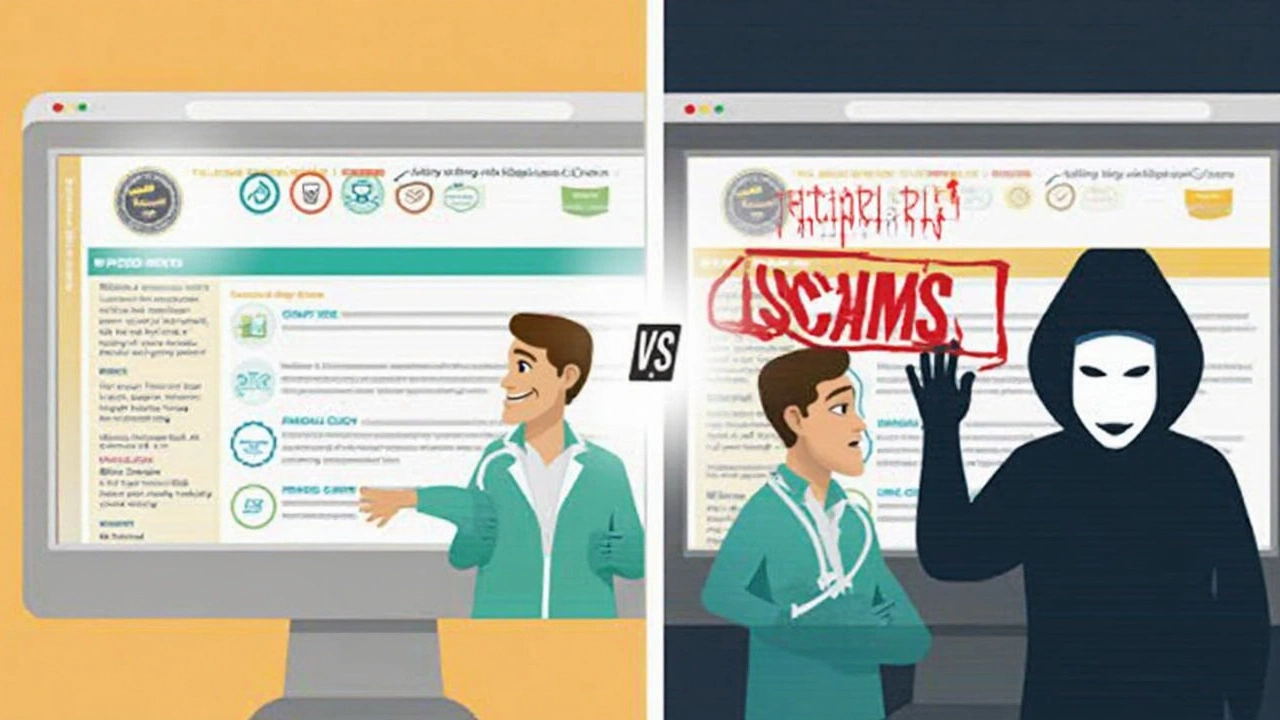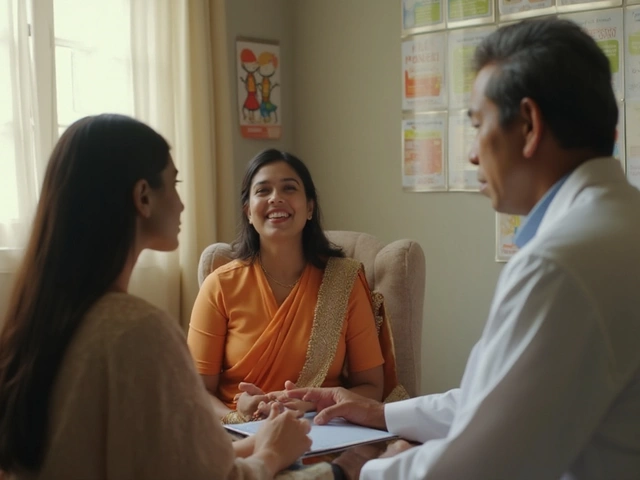Fake online pharmacies are everywhere, and some are pretty convincing. A scary number of websites claim to sell medicines but actually ship out fake or wrong products. So before you trust any site with your health and cash, there’s some stuff you need to check.
First thing—always look for the basics. Is the pharmacy asking for a valid prescription from a doctor? If not, that's usually a huge red flag. Real pharmacies play by the rules, even online. Another quick check—see if their address, phone number, and license info are easy to find on the webpage. If all you get is a sketchy contact form, you might want to back out right there.
Online pharmacies should never offer to sell you 'miracle cures,' oddly cheap meds, or drugs without asking any questions. Those are classic warning signs. Good sites will have real pharmacists you can actually message or call if you have questions. If the service just feels off—or seems too good to be true—it probably is.
- Spotting the Red Flags
- Verifying Pharmacy Credentials
- Prescription Requirements Matter
- Comparing Costs and Delivery
- Checking Customer Reviews and Support
- Protecting Your Privacy and Personal Data
Spotting the Red Flags
Here's a truth most folks don’t realize: nearly 95% of online pharmacies are breaking the law or flat-out scamming people. That’s not just rumor—studies by the National Association of Boards of Pharmacy (NABP) have found thousands of illegal sites selling medicine that’s poor quality, fake, or even dangerous. Miss one small detail and you could put your health at real risk.
So, how do you tell the difference between a real online pharmacy and a scam artist? Watch for these red flags before even thinking about hitting ‘buy’:
- online pharmacy doesn’t ask for a prescription. Real sites always want your doctor’s note before selling prescription drugs. No questions? Big problem.
- Prices that seem way too low. If a pharmacy is selling brand-name pills for half the usual cost, it’s almost always fake, stolen, or expired stock. Trust your gut here.
- No physical address or phone number given—just a contact form or generic email. Legit pharmacies have real addresses, listed phone numbers, and customer service you can actually reach.
- Strange website design, misspelled words, or generic logos. These small things often mean the site popped up overnight and will vanish just as fast.
- Crazy promises, like "no prescription needed" or "miracle cures." If it sounds sketchy, it is. Real pharmacies stick to the law.
If you need hard proof, here’s some data from the NABP you should see:
| Red Flag | What It Means |
|---|---|
| No prescription required | Likely illegal, meds could hurt you |
| Super cheap prices | Usually fake or stolen products |
| Missing address/phone | Hard to hold anyone accountable if things go wrong |
| Odd site design or errors | Quick setup, possible scam |
Spotting these signs early saves you a ton of trouble later. Don’t ignore your gut if something feels off. Take a second and check twice before sharing your info or money.
Verifying Pharmacy Credentials
This step is probably the most important in your hunt for a safe online pharmacy. If you skip it, you’re basically taking a gamble with your health.
So, how do you verify if an online pharmacy is legit? Start with their license. In the US, for example, only pharmacies that hold a state license can operate legally. Look for proof right on the website. Most real pharmacies show off their accreditation or license numbers at the bottom of every page. You can double-check this info on state pharmacy boards or national verification sites, like NABP’s (National Association of Boards of Pharmacy) site called Safe.pharmacy.
- In the US, look for the .pharmacy domain or the VIPPS seal (Verified Internet Pharmacy Practice Sites).
- In the UK, the MHRA (Medicines and Healthcare products Regulatory Agency) logo should be clear and clickable, sending you to their registration page.
- Canada’s CIPA (Canadian International Pharmacy Association) also lists verified online pharmacies on its site.
Scammers sometimes copy logos or seals, but the real thing will always link to a live, official registry. Take the extra 30 seconds to check. If the link goes nowhere or looks shady, trust your gut and move on.
Here’s a quick way to spot real vs. fake:
| Check | Legit Pharmacy | Fake Pharmacy |
|---|---|---|
| License Number/Accreditation | Listed clearly; verifiable online | Missing, fake, or can’t be checked |
| Contact Info | Physical address, real phone number | Just an email or form, no address |
| Seals or Logos | Clickable, link to official registry | Non-clickable, just a picture |
And one last thing—don’t trust a pharmacy just because its site 'looks professional.' Scammers put a lot into making fancy websites now. It’s about the proof, not the design.
Prescription Requirements Matter
Online pharmacies that play by the rules will always ask for a valid prescription when you’re buying most medications. This isn’t just some hurdle—they’re protecting you from getting the wrong meds or unsafe doses. In the U.S., the FDA makes it clear: all prescription drugs sold online legally must require an actual prescription from a licensed doctor. Any site offering things like antibiotics, blood pressure pills, or even things like ADHD meds without a prescription is cutting corners, and you could pay for it with your health.
Here’s why this matters. Drugs aren’t candy. Taking the wrong medicine, or the wrong amount, can cause real trouble—from nasty side effects to dangerous drug interactions. A legit online pharmacy uses your prescription as a safeguard, double-checking that you’re getting the right thing at the right dose.
- If a website lets you “self-prescribe” or skips the prescription step completely, that’s a crystal-clear warning sign.
- Sometimes, shady sites lure you in with a couple of ‘quick questions’ instead of a real prescription process. That doesn’t cut it, especially for controlled drugs.
- Reputable online pharmacies will often reach out to your doctor directly or ask you to upload your prescription.
Here’s a side-by-side look at what the law says in different places:
| Country | Prescription Required Online? |
|---|---|
| US | Yes (strict FDA rules) |
| UK | Yes (regulated by MHRA) |
| India | Usually Yes (new laws are stricter) |
| Canada | Yes (Health Canada regulated) |
Let’s be real: if you find an online pharmacy that skips the whole prescription thing, move on. Protect yourself—stick with sites that treat online pharmacy safety as a priority, because your health is worth that extra step.

Comparing Costs and Delivery
Prices for the same medicine can jump wildly between online pharmacies. Some sites lure you in with rock-bottom costs but then pile on steep shipping fees or sneak in hidden charges at checkout. Always use the shopping cart to see your real total before you commit. Small price drops are normal, but if one pharmacy is offering a name-brand drug for half the average price, double-check it—cheap can mean counterfeit.
The online pharmacy market has legit price competition, especially for common meds like blood pressure pills or antibiotics. But even then, the lowest price isn’t always the best deal if you end up waiting weeks for delivery or your medicine comes from questionable sources. Here are things you should check:
- Shipping time: Not every site ships as quick as it claims. Check customer reviews for real feedback and look for express and standard timelines on the site.
- Shipping location: Is the medicine coming from your country, the other side of the world, or a mystery warehouse? Products from overseas can take longer and possibly get stopped at the border.
- Refunds and guarantees: See what happens if your medicine arrives late, damaged, or not at all. Reliable pharmacies clearly share refund policies and have a simple claim process.
- Bulk deals or subscriptions: Some legit sites give you a discount if you buy more or sign up for auto-refills. That’s handy for regular prescriptions.
Here’s a quick side-by-side look at what you might get from different online pharmacies:
| Pharmacy | Price for 30 tabs (Generic Lipitor) | Estimated Delivery | Shipping Fee | Refund Policy |
|---|---|---|---|---|
| Pharmacy A (US based) | $35 | 3-5 days | $5 | Full refund if delayed 7+ days |
| Pharmacy B (Canada based) | $28 | 7-14 days | $7 | Partial refund, no questions asked |
| Pharmacy C (International) | $18 | 15-30 days | Free | No refunds for missed delivery |
These numbers are real as of early 2025. The gaps in delivery times and refund policies matter even more than a couple dollars off the price. Fast shipping from a known source is usually worth a couple bucks extra, especially if you need your medicine right away.
Checking Customer Reviews and Support
Before you hit “buy” on any online pharmacy, make sure to snoop around for real customer feedback. Here’s something wild—about 95% of online pharmacy websites, according to the National Association of Boards of Pharmacy (NABP), are operating out of compliance. That means you can’t just trust a site because it looks professional.
Jump on third-party review sites like Trustpilot or Google Reviews. Don’t just look for star ratings—dig into the comments. Look out for reviews that mention the site delivering fake products, charging extra, or not delivering at all. If a pharmacy only has glowing five-star reviews or no reviews at all, that’s pretty suspicious. Mix of positive and negative feedback usually means they're real.
When it comes to support, legit pharmacies have ways for you to reach a human—phone, chat, or email. Try contacting them with a simple question about a online pharmacy process, like what info they need from your doctor. Do they answer quickly, or is it radio silence? No customer support, or support that just sends you canned responses, is a big no-go.
Here’s a quick breakdown of what real users care about most, based on a 2023 industry survey:
| Issue | % Customers Reporting This |
|---|---|
| On-time Delivery | 52% |
| Quality of Medication | 47% |
| Responsive Customer Service | 39% |
| Easy Refunds/Returns | 23% |
Couple of simple tips:
- Always search the pharmacy’s name plus “scam” or “complaint” and see what pops up.
- Be cautious if reviews mention sudden price jumps, or disappearing support after purchase.
- Check if they publish customer service hours and multiple ways to reach them, not just a shady contact form.
If the customer reviews and support stack up, that’s a good sign you’re dealing with a real business. If anything feels dodgy, it’s smarter to step away and keep looking.
Protecting Your Privacy and Personal Data
Ordering medicine online is pretty convenient, but don’t overlook what happens with your personal info. Every time you order, you hand over sensitive details—your name, address, health info, maybe even your credit card. And let’s face it, if that data gets into the wrong hands, it’s trouble.
Legit pharmacies have no problem showing you their privacy policy. If a website is missing one or makes it hard to find, that's a problem. Always check that the pharmacy uses encrypted connections (look for "https" and a padlock icon in the address bar). If the connection isn’t secure, close the page immediately.
- Never send personal or medical info by email or messaging apps. Stick to secure forms on the pharmacy’s website.
- Only share details that are necessary for your order. If a site asks for stuff like your Social Security number, that's not normal.
- Check if the pharmacy states they will never sell your data to marketers or third parties. If they don’t mention it, think twice.
Surprisingly, a 2023 survey showed that almost 30% of people who bought medicine online had their info shared with third parties without them knowing. That can mean spam, phone scams, or worse.
| Risk | Example |
|---|---|
| Identity theft | Someone opens accounts in your name |
| Phishing scams | Fake emails or calls asking for more details |
| Unwanted marketing | You get flooded with ads for drugs you never wanted |
Bottom line: Make sure you’re dealing with a online pharmacy that takes privacy seriously. Don’t be afraid to ask about their data policy or switch sites if you’re not comfortable. Your health info should only go to people who need it—like your doctor or pharmacist—not random companies.





